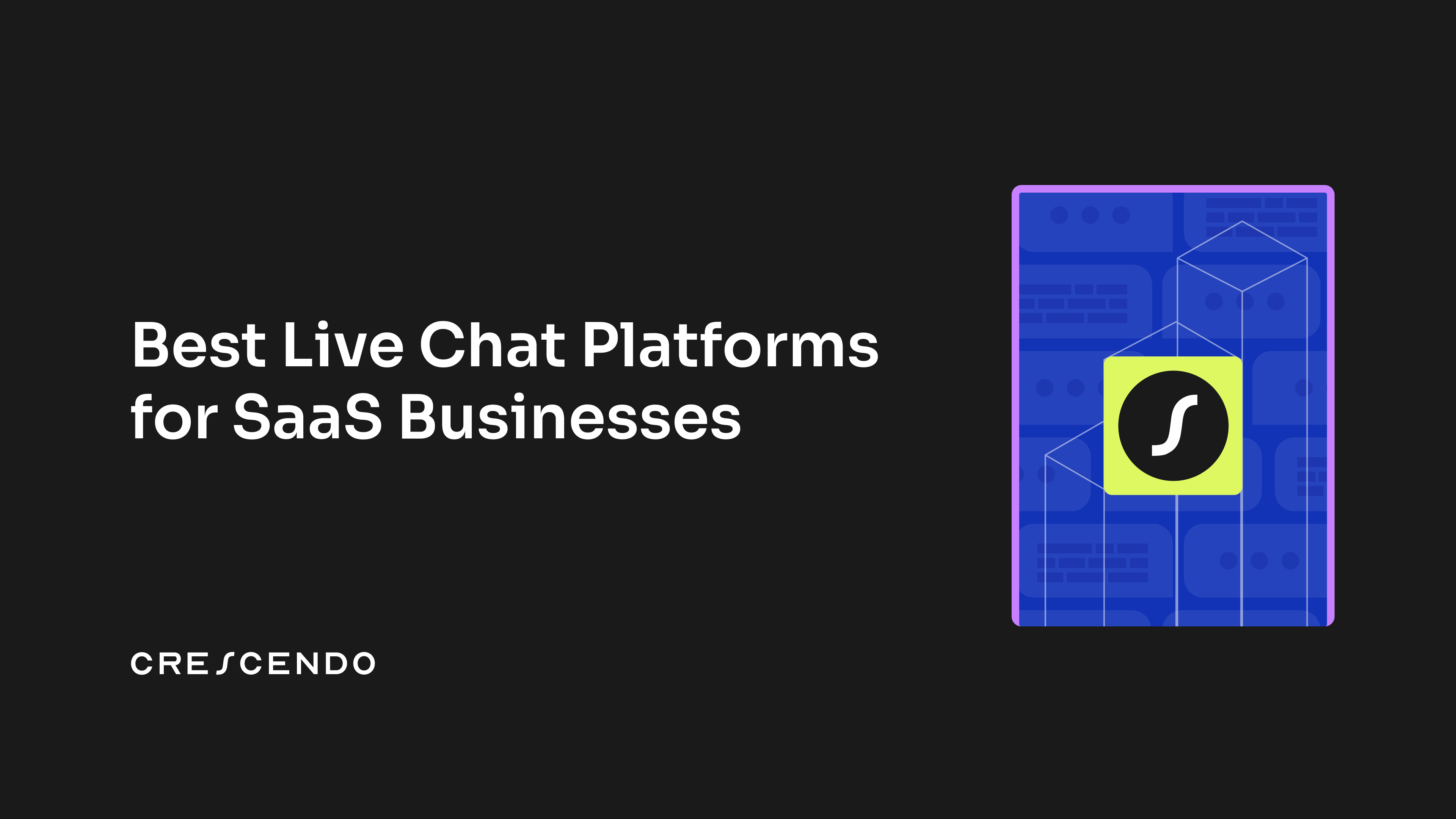8 Best Live Chat Platforms for SaaS Businesses | 2026
For SaaS companies, giving customers quick and personalized support will become a survival issue in 2026. According to HubSpot, 90% of customers say getting an immediate response is very important, and Salesforce found that 78% of users expect the same level of service across all channels.
With SaaS churn rates averaging 10–14% a year, every step towards best customer service can make a difference. That’s why using a live chat platform with smart automation helps SaaS teams answer faster, reduce churn, and turn trial users into loyal customers.
In this article, we have handpicked eight of the most popular live chat platforms for SaaS companies.
Top Live Chat Platforms for SaaS Companies for 2026
After evaluating 21 live chat platforms for SaaS based on ease of use, pricing, features, and how well they use the latest AI agents for customer support, we’ve shortlisted six platforms you should explore before integrating live chat support into your business.
1. Crescendo.ai
Crescendo.ai is a leading AI live chat platform for SaaS businesses to provide 24/7 support in 50+ languages. It is developed to solve all types of SaaS queries, like API integrations, installations, tech troubleshooting, data migrations, onboarding flows, compliance, billing, bug fixes, and many more in just $1.25/resolution (starting price).
It's package by default covers 100% onboarding, configuration, integrations and maintenance by their expert AI deployment engineers (AIDEs). Plus, services of customer support reps, CX experts, and QA professionals are also available.
See how Crescendo.ai’s latest multimodal AI works in real-world scenarios.
While the above video demonstrates a retail use case, the experience works exactly the same for SaaS support. Customers can send audio messages within the same chat interface, upload screenshots, videos, and documents, and clearly explain complex issues, allowing the AI to understand context better and deliver accurate, end-to-end resolutions.
Features
- Live chat: 24/7 chat support for SaaS in 50+ languages with advanced AI and skilled humans.
- Omnichannel support: Customers get help via chat, voice, email, or SMS, with human-like empathy and 99.8% accuracy.
- White-labeling: The chat window will be 100% white-labeled with your brand colors, logo, style, font, and even tone.
- Multimodal chat support: Users can now communicate using both text and voice messages (using the audio tab) within the same chat window
- Human-backed support: Get services of 3,000+ trained support representatives, QA and CX professionals, and AI deployment engineers as part of the package.
- Analytics dashboard: An insightful Voice of Customer (VoC) platform that records, transcribes, summarizes, and categorizes all the support queries. It provides insightful reports and actionable recommendations.
Pros
- Equipped with the unique multimodal chat support that offers text and voice support in the same support channel.
- Designed to solve all types of SaaS business-specific queries, even the most in-depth and technical ones.
- Integrates seamlessly with various CRM and helpdesk systems, ensuring a smooth workflow and data consistency across platforms.
- Supports chat, voice, email, SMS across 50+ languages.
- Real-time CSAT, sentiment analysis, topic categorisation, unified reporting across channels.
Cons
- It’s not for micro-SaaS startups. Suitable for business with at least 15,000 support tickets (combined in all channels i.e. chat, voice, email and SMS) per year.
- Does not provide SDKs. Its deployment engineers and CX experts handle the implementation and customization part per your technical requirements and branding guidelines.
Best for
Crescendo.ai is an ideal live chat tool for any SaaS business that requires a hands-free, white-labeled, all-in-one support platform with AI and human collaboration.
2. Sierra.ai
Sierra.ai is an advanced live chat platform built for SaaS companies that want full control and flexibility through software development kits (SDKs). It allows teams to use AI chat directly in their web or mobile apps, making customer support more integrated and intelligent.
Unlike traditional chat tools, Sierra can trigger in-app actions like subscription changes, billing updates, or feature activations, all from within the chat. This makes it ideal for SaaS businesses looking to connect customer conversations directly with backend workflows.
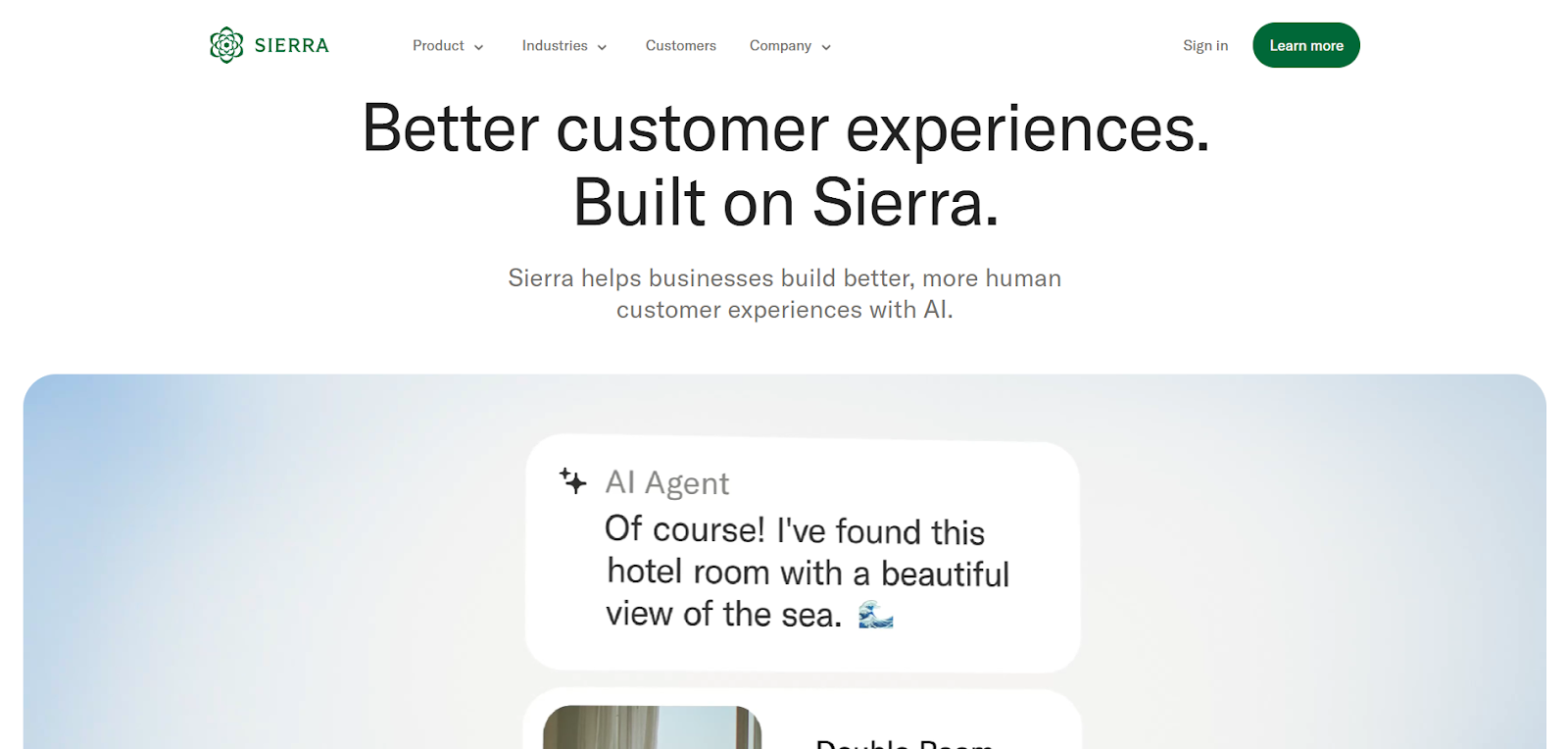
Features
- AI-driven conversations: Build intelligent agents capable of resolving queries and performing tasks autonomously.
- Omnichannel engagement: Manage customer interactions across chat, voice, and messaging channels easily.
- Brand-aligned tone: Create conversational agents that reflect your brand’s tone, personality, and empathy.
- System integrations: Connect Sierra with CRMs, billing tools, and other internal systems for automated updates and actions.
- Performance insights: Access real-time analytics to measure agent efficiency and improve service quality.
Pros
- Highly customizable with SDKs for deep integration into SaaS products.
- Scales easily across channels, helping reduce manual workload for support teams.
- Delivers brand-consistent conversations according to your tone and voice.
- Clean and intuitive interface for both customers and internal users.
Cons
- Implementation requires technical expertise and can take time to set up.
- Pricing details aren’t publicly transparent and may not suit smaller SaaS startups.
- Limited capability for managing highly complex, multi-step workflows.
Best for
Sierra.ai is best suited for mid-size to enterprise SaaS companies with in-house technical resources that want to build custom, deeply integrated conversational agents aligned with their product and backend operations.
3. Crisp
Crisp is an AI-powered, multichannel customer messaging and live chat platform that helps SaaS businesses deliver real-time support, automate routine conversations, and centralize customer communication in one inbox. Its focus on simplicity and automation makes it ideal for teams that want to engage users during onboarding, support, and sales without complex setup.
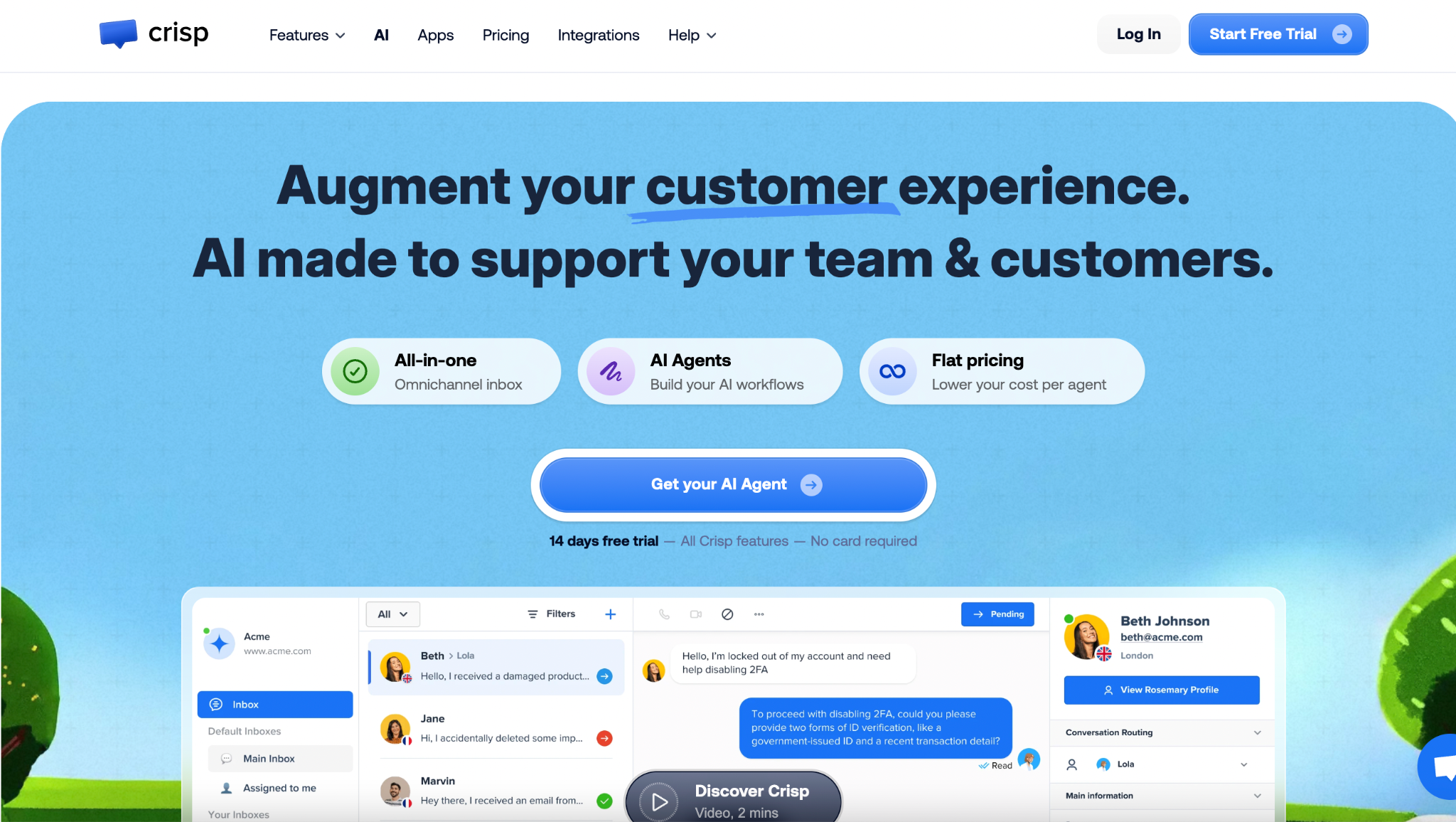
Features
- Real-time live chat: Engage SaaS users instantly on your website or in-app with fast, responsive live chat support.
- AI chat automation: Automate FAQs, onboarding questions, and routine support requests using AI-powered bots and workflows.
- Shared team inbox: Manage all customer conversations from live chat, email, and social channels in one unified inbox.
- Customer context & profiles: View user history, behavior, and past conversations to deliver more personalized support.
- Multilingual messaging: Communicate with global SaaS users in multiple languages with automatic language detection.
Pros
- Simple to deploy and manage, even for non-technical teams.
- Combines live chat with a shared team inbox for customer support, sales, and marketing.
- AI chatbot and automation reduce manual support load.
- Affordable entry-level plans with robust essential live chat features.
Cons
- Advanced automation and analytics require higher-tier plans.
- Not as rich in enterprise-grade reporting or CRM-native analytics as some competitors.
- Initial learning needed to configure complex bot workflows.
Best for
SaaS companies seeking a unified live chat + support inbox with AI-assisted automation that’s easy to implement and scales from startups to mid-sized teams.
4. Freshchat
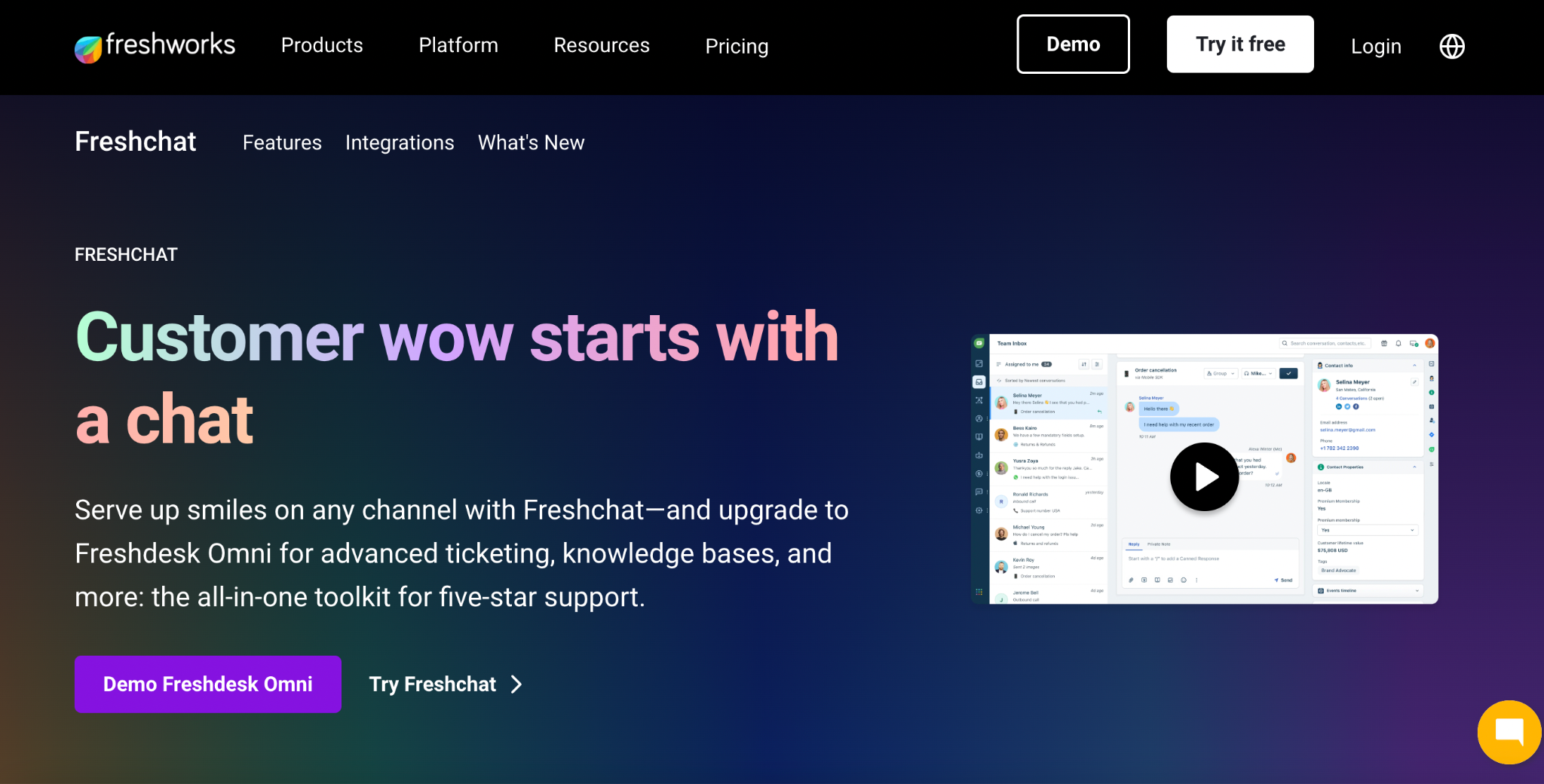
Freshchat is a modern, AI-enhanced live chat and messaging platform from Freshworks that helps SaaS businesses communicate with users across web, mobile, and social channels. With proactive messages, AI bots, and deep customization, Freshchat supports real-time engagement that boosts support efficiency and helps convert prospects into customers.
Features
- Live chat for web & mobile: Provide real-time support across SaaS websites, web apps, and mobile applications.
- AI-powered chatbots: Use AI bots to answer common questions, qualify leads, and reduce agent workload.
- Proactive messaging: Trigger targeted messages based on user behavior, lifecycle stage, or page visits.
- Unified agent workspace: Handle conversations from live chat, apps, and messaging channels in one agent dashboard.
- Conversation analytics: Track response times, resolution metrics, and user engagement to optimize support performance.
Pros
- Powerful multichannel engagement including web chat, social, and app messaging.
- AI bots and automation reduce manual workload for support teams.
- Easy integration with Freshworks ecosystem (CRM, helpdesk, marketing).
- Intuitive UX and shared inbox help teams stay coordinated.
Cons
- Chatbot sophistication and AI may lag more advanced standalone solutions.
- Some features can be hard to find or require configuration time.
- Best value often realized when paired with broader Freshworks products.
Best for:
SaaS teams looking for a scalable live chat with built-in AI and multichannel messaging, especially if they already use or plan to adopt the Freshworks ecosystem.
5. Zoho SalesIQ
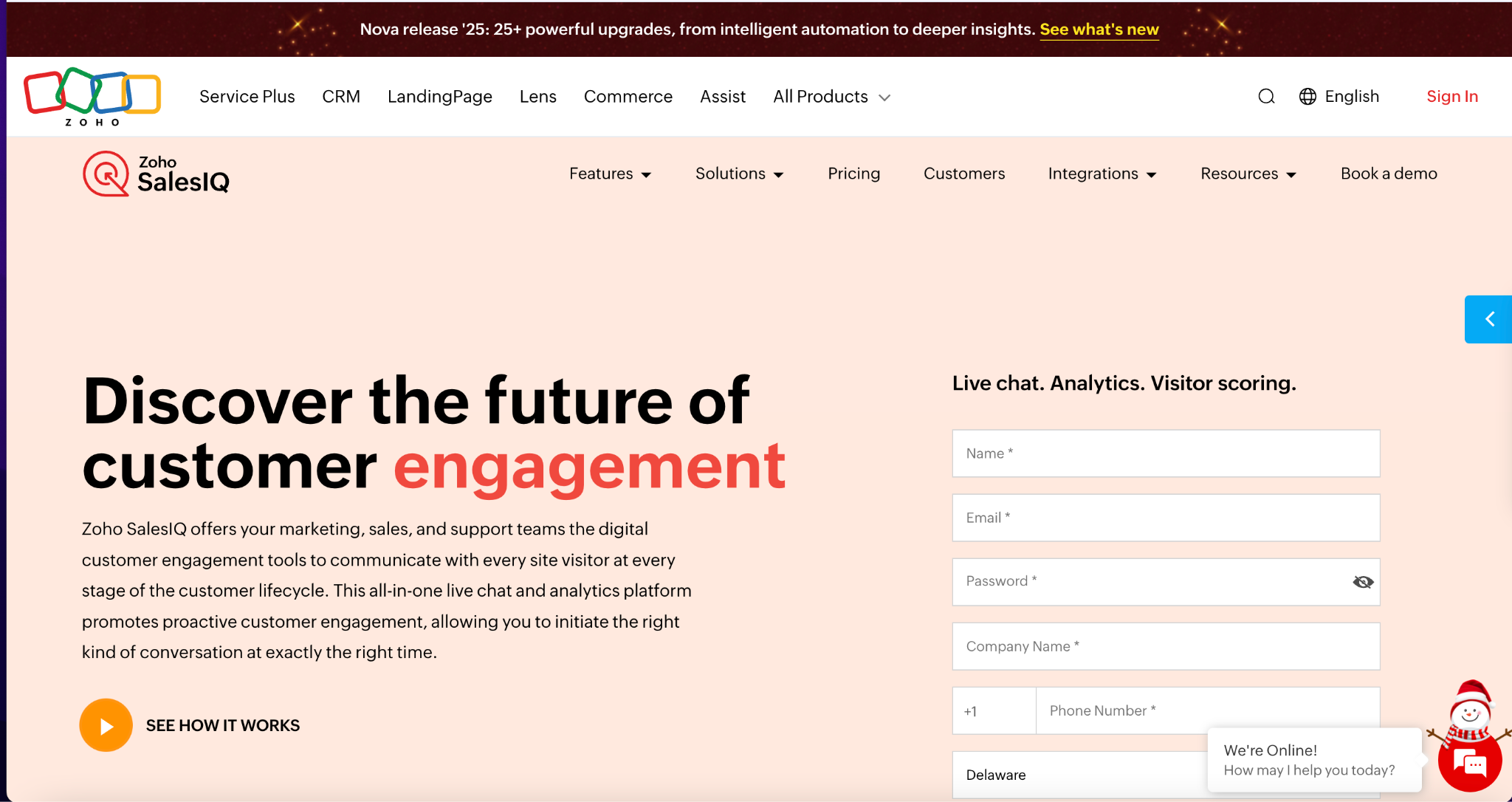
Zoho SalesIQ is an all-in-one customer engagement and live chat platform that gives SaaS businesses real-time visitor insights, proactive chat triggers, intelligent routing, and automation all inside a single dashboard. Its combination of live chat, analytics, and bots helps SaaS companies engage prospects, accelerate conversions, and support users effectively.
Features
- Live website & in-app chat: Offer real-time chat support to SaaS visitors and logged-in users across web and mobile.
- Visitor tracking & lead intelligence: Identify high-intent users with real-time visitor insights and engagement scoring.
- Codeless chatbot automation: Build and deploy chatbots without coding to handle repetitive support and sales queries.
- Advanced engagement tools: Support customers using screen sharing, voice calls, and remote assistance within chat.
- Performance analytics: Monitor chat performance, agent productivity, and conversion impact with detailed reports.
Pros
- Deep visitor analytics and segmentation help SaaS marketing and sales teams.
- Codeless bots make automation accessible without technical expertise.
- Multi-channel integrations (WhatsApp, social) centralize engagement.
- Rich engagement features like screen share and audio call set it apart from basic live chat tools.
Cons
- Can feel overwhelming for very small teams due to its breadth of features.
- Some advanced automation features may require higher-tier plans.
- Setup and customization may take longer than simpler live chat solutions.
Best for:
SaaS businesses that want live chat plus visitor intelligence and engagement tools, especially valuable for demand generation, lead qualification, and proactive user support.
6. Decagon.ai
Decagon AI is an enterprise-grade conversational agent platform designed to automate customer support operations across chat, email, and voice channels. It supports SaaS and other high-volume digital businesses by integrating AI agents into real workflows, resolving tasks such as refunds, subscription changes, and account issues rather than just answering questions.
The platform focuses on transparency and control, offering tools that allow businesses to understand how the AI is making decisions, monitor and iterate the agents, and ensure the system aligns with the brand and operational logic.
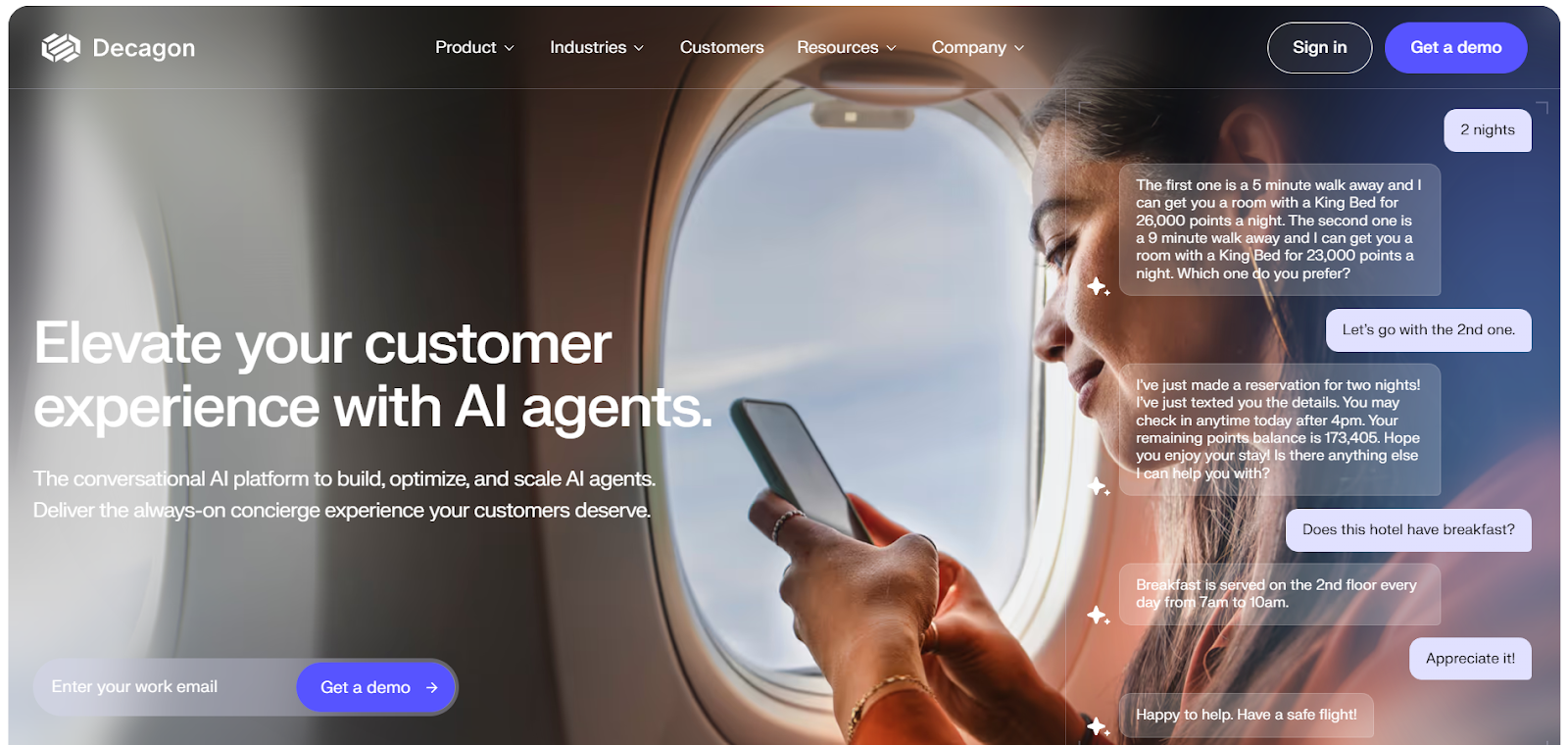
Features
- Omnichannel AI agents: Handles conversations across chat, email, and voice using the same underlying agent architecture.
- Action-oriented workflows: The agents don’t just respond but can execute actions such as updating accounts or handling returns integrated with business systems.
- Transparent & visible AI: Provides dashboards and feedback mechanisms so you can see how decisions are made and refine agent behaviour over time.
Pros
- Built for higher-complexity support scenarios, with deep integration and automation capabilities.
- Suits organisations that want to reduce support costs and scale while maintaining quality and brand experience.
- Emphasises trust and control in AI-support deployment, which is valuable for operations sensitive to errors or compliance.
Cons
- Because it’s a feature-rich and workflow-oriented platform, implementation is likely to require significant setup, configuration, and operational readiness.
- It may be more costly for smaller SaaS teams that only need basic chat or simple support routes.
- Strong in automation, but hybrid human-AI handoffs can be tricky for some use cases.
Best for
Decagon AI is best suited for mid-to-large-sized SaaS or digital businesses with established support operations, engineering or ops teams, and a need to integrate customer support deeply with backend workflows and automation (not just a chat widget).
7. Forethought
Forethought is an AI-powered customer support automation platform that includes live chat, ticket deflection, and workflow intelligence, all designed to streamline support for SaaS teams. It helps companies proactively resolve customer issues, reduce ticket volume, and surface relevant knowledge instantly through AI.
Unlike basic chatbots, Forethought combines automation with deep learning to understand intent, sentiment, and urgency, enabling faster and more accurate resolutions across email, chat, voice, and internal tools like Slack.
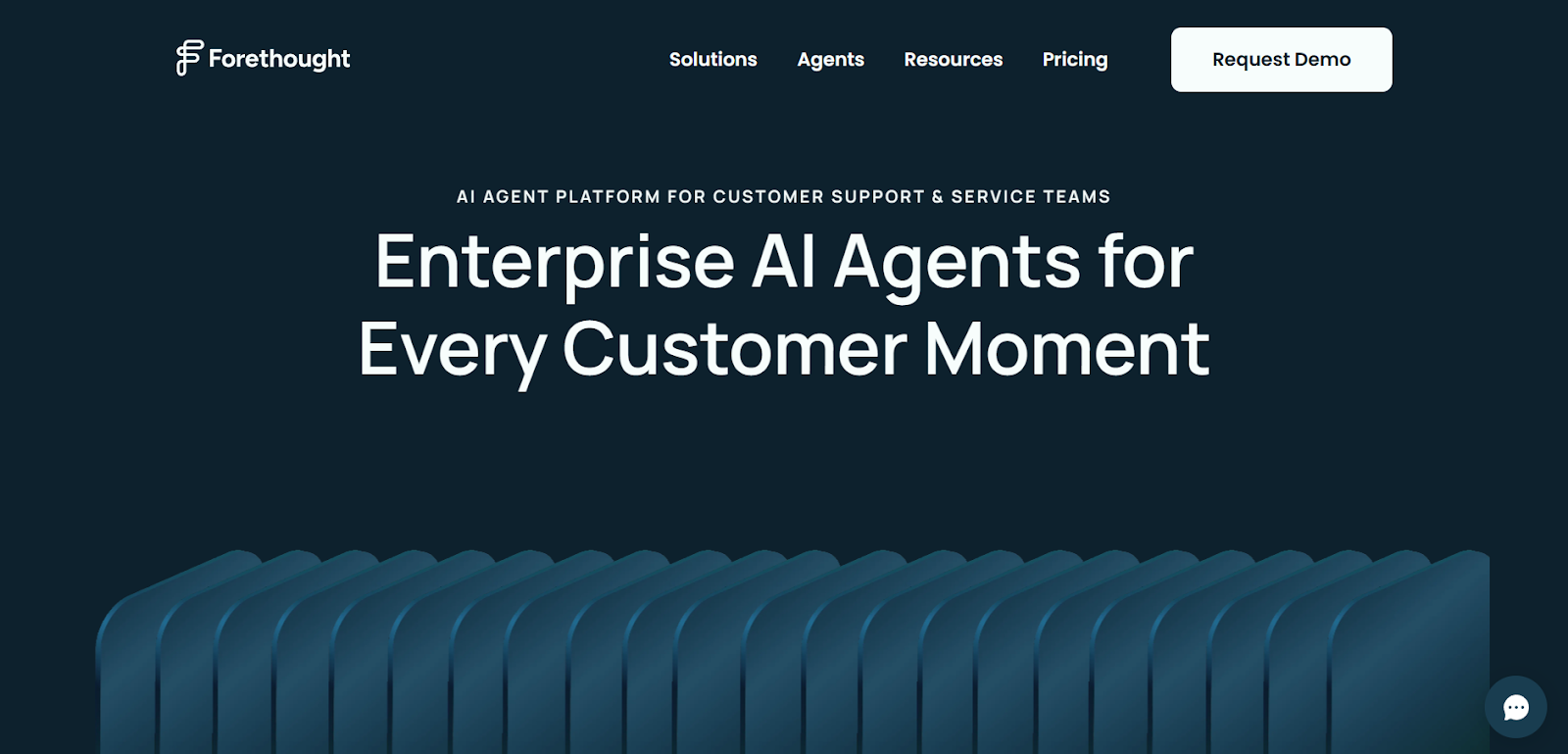
Features
- Omnichannel automation: Integrates with chat, email, voice, and Slack for consistent, AI-driven support.
- AI-driven workflows: Uses natural language prompts to automate resolutions without manual decision trees.
- Agent assist: Suggests responses, provides knowledge articles, and guides agents through workflows in real time.
- Smart ticket management: Automatically classifies, prioritizes, and routes tickets based on sentiment and urgency.
- Analytics & insights: Tracks support trends, identifies ticket drivers, and highlights knowledge gaps for improvement.
Pros
- Excellent for SaaS teams handling large volumes of repetitive support requests.
- Frees human agents to focus on complex, high-value customer issues.
- Highly customizable to reflect your brand’s tone and communication style.
- Improves self-service effectiveness with proactive knowledge surfacing.
Cons
- Setup and integration may require technical assistance or internal expertise.
- Pricing details are not publicly available and may vary by organization size.
- Workflow customization can take time for non-technical teams.
Best for
Forethought is best suited for mid-to-large SaaS businesses that manage continuous ticket inflow and want to automate repetitive tasks, enhance agent productivity, and deliver intelligent AI-driven live chat support experiences.
8. Zendesk Live Chat
Zendesk Live Chat is a customer messaging solution built to help SaaS companies deliver real-time support and boost customer satisfaction. Integrated within the Zendesk ecosystem, it allows support teams to engage customers directly on websites, mobile apps, or social channels, all while tracking conversations in a unified workspace.
It’s designed for fast, personalized interactions and works seamlessly with Zendesk’s ticketing and knowledge base tools, making it ideal for SaaS businesses that want to streamline customer communication without juggling multiple tools.
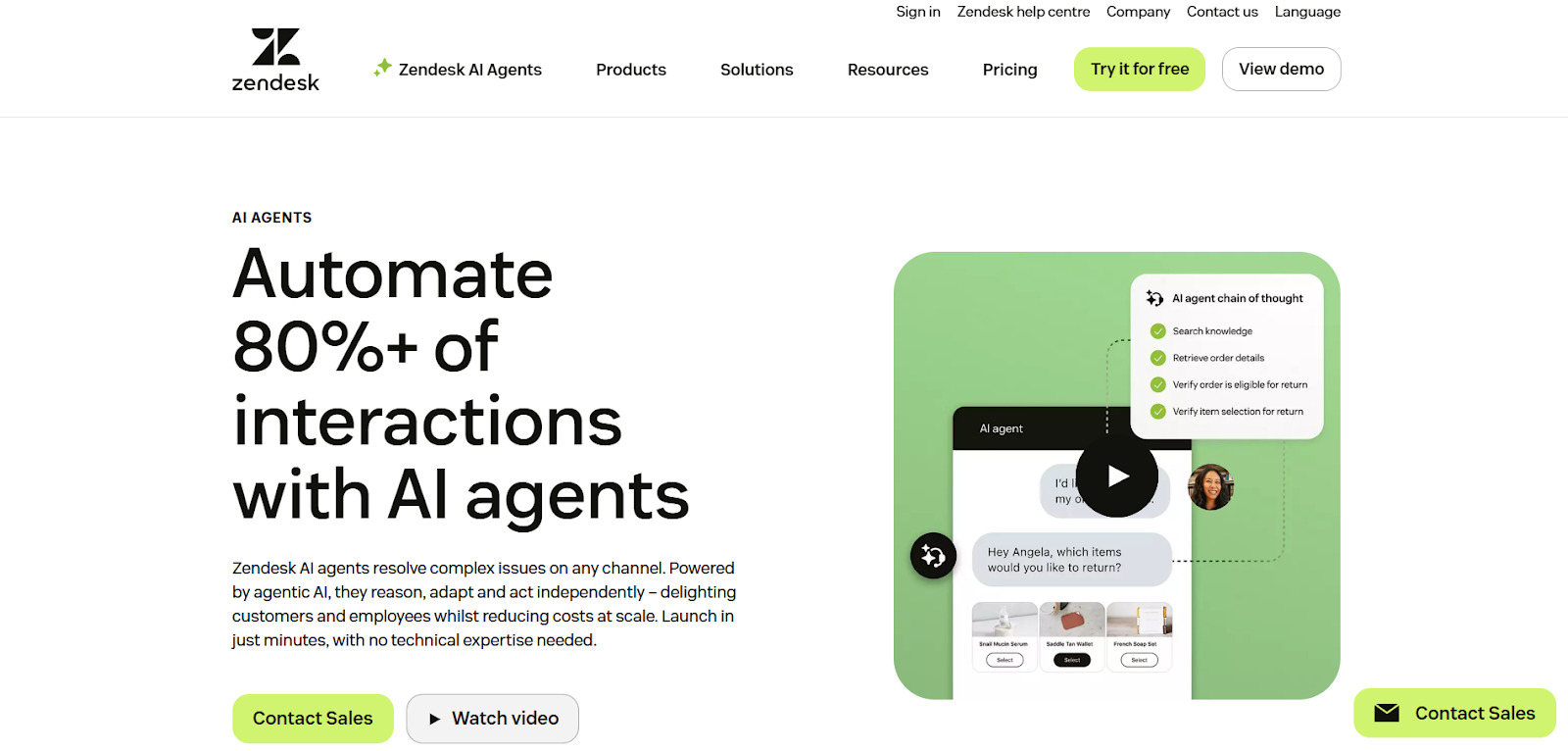
Features
- Real-time chat: Engage customers instantly via website or in-app chat widgets.
- Unified agent workspace: Manage chat, email, and social messages in one dashboard.
- AI-powered bots: Automate responses and triage incoming messages before routing to agents.
- Pre-chat forms & triggers: Capture lead information or set automated greetings based on visitor behavior.
- Integrations: Connect with CRMs, helpdesk systems, and e-commerce platforms for context-rich support.
- Reporting & analytics: Access performance dashboards to track response times, customer satisfaction, and agent productivity.
Pros
- Seamlessly integrates with Zendesk’s full customer service suite (Support, Guide, Talk, etc.).
- Offers a clean, professional interface that’s easy to navigate.
- Strong automation, routing, and tracking capabilities for scaling SaaS operations.
- Enables proactive engagement through behavior-based triggers and analytics insights.
Cons
- Some users report higher costs as teams scale up.
- Advanced customization options may require additional setup or developer support.
- Reporting depth is solid but may require add-ons for more granular insights.
Best for
Zendesk Live Chat is best for SaaS companies already using Zendesk’s ecosystem or those needing a reliable, enterprise-grade live chat system with automation, analytics, and omnichannel support built in.
FAQs: Live Chat & AI Chat Platforms for SaaS
1. What should a SaaS company look for in a live chat platform?
A SaaS live chat platform should include these 7 essential features:
1. Ability to handle large volumes of simultaneous chats without downtime. 2. AI automation 3. Multimodal support i.e. Support for text, audio messages, screenshots, documents, and videos in a single chat 4. Capability to manage long, multi-step SaaS use cases like onboarding and technical troubleshooting. 5. Seamless human handoff with full context preserved. 6. CRM & helpdesk integrations 7. Powerful analytics and reports on customer issues, performance, and trends.
2. How does live chat help SaaS companies increase conversions?
Live chat increases SaaS conversions by providing instant, real-time assistance across the website and in-app experience. During the pre-purchase phase, it helps users with product features, pricing evaluation, free trials, onboarding questions, and usage guidance, removing friction at critical decision points. Post-purchase, live chat supports onboarding, account setup, billing queries, and technical troubleshooting, ensuring customers get value quickly and don’t unsubscribe due to unresolved issues or confusion.
3. What’s the difference between traditional live chat and AI-powered chat?
Traditional chatbots rely on scripted flows and fixed decision trees, which limits them to simple, predefined interactions. AI-powered chat platforms automate end-to-end customer support by understanding intent, reasoning through problems, resolving issues, and escalating intelligently when needed. Modern solutions like Crescendo.ai pull answers in real time from knowledge bases, product docs, policies, CRMs, and past conversations, allowing them to resolve complex queries naturally instead of forcing users through rigid chatbot paths.
4. Can AI live chat handle complex SaaS support issues?
Yes. Modern AI live chat platform for SaaS like Crescendo.ai can handle multi-step SaaS issues by analyzing user messages, screenshots, logs, documents, and context. Advanced platforms use hybrid AI + human models to ensure complex or sensitive cases are resolved accurately.
5. When should a SaaS company replace its existing chatbot with AI live chat?
SaaS companies should replace legacy chatbots when users experience low resolution rates, long downtimes, high escalation volumes, or poor CSAT. AI live chat is ideal when businesses want accurate, contextual, and scalable customer conversations.
6. How does live chat improve SaaS onboarding and product adoption?
Live chat supports onboarding by providing real-time guidance, feature explanations, and setup help directly inside the app. AI chat can proactively assist users based on behavior, reducing confusion and improving product adoption.
7. Can live chat integrate with SaaS tools like CRM and helpdesk software?
Yes. Most modern live chat platforms integrate with CRMs, ticketing systems, billing tools, analytics platforms, and internal databases. This allows agents and AI to access customer context and resolve issues faster.
8. How much does AI-powered live chat cost for SaaS companies?
Pricing varies based on usage, automation level, and features. Some platforms charge per agent or per conversation, while others, like Crescendo.ai, charges $1.25 per-resolution.
9. Can live chat support both sales and customer support teams?
Yes. Live chat is widely used by SaaS sales teams for lead qualification and demos, and by support teams for troubleshooting and retention. A unified chat platform ensures a consistent experience across the customer lifecycle.
10. Does AI live chat reduce the need for human support agents?
AI live chat reduces the volume of repetitive tickets but does not eliminate human agents. Instead, it enables agents to focus on high-value, complex, or sensitive issues while AI handles routine queries at scale.
11. How do SaaS companies measure live chat performance?
Key metrics include first response time, resolution time, CSAT, first-contact resolution, conversion rate, and deflection rate. Advanced platforms also provide sentiment analysis and conversation-level insights.
12. Is live chat secure for SaaS products handling sensitive data?
Yes, enterprise-grade live chat platforms follow strict security standards such as data encryption, access controls, and compliance with regulations like GDPR and SOC 2, making them suitable for SaaS environments.
13. Can live chat work inside SaaS web apps, not just websites?
Absolutely. Most modern live chat solutions can be embedded directly into SaaS dashboards and applications, allowing users to get help without leaving the product interface.
14. What are common mistakes SaaS teams make when implementing live chat?
Common mistakes include over-reliance on basic chatbots, poor knowledge base setup, lack of AI training, and no clear escalation path to humans. Successful SaaS teams treat live chat as a core CX channel, not a simple widget.
15. How to choose the best live chat platform for your SaaS business?
Seven key questions to ask before choosing a live chat platform for the SaaS business.
1. Integrations: How seamlessly does the chat tool integrate with your product, CRM, and knowledge base? (e.g., user identity, subscription data, usage context)
2. Scalability: Can it handle growth, i.e., from hundreds to thousands of chats per month, without lag or downtime?
3. Technical Overhead: How much developer bandwidth will it take to configure, customize, and maintain the chat system?
4. Automation Coverage: What percentage of queries can the chatbot resolve autonomously, and how many need to be escalated to human agents?
5. Chatbot Intelligence: Is it a simple rules-based bot for FAQs or an advanced AI chat agent capable of resolving complex customer issues?
6. Triage Efficiency: When escalating to a human, does the chat system summarize context and recommendations, or will customers need to repeat themselves?
7. Pricing Structure: Is the pricing per resolution, per agent/month, or fixed? Are SDKs, add-ons, and upgrades included or charged separately?
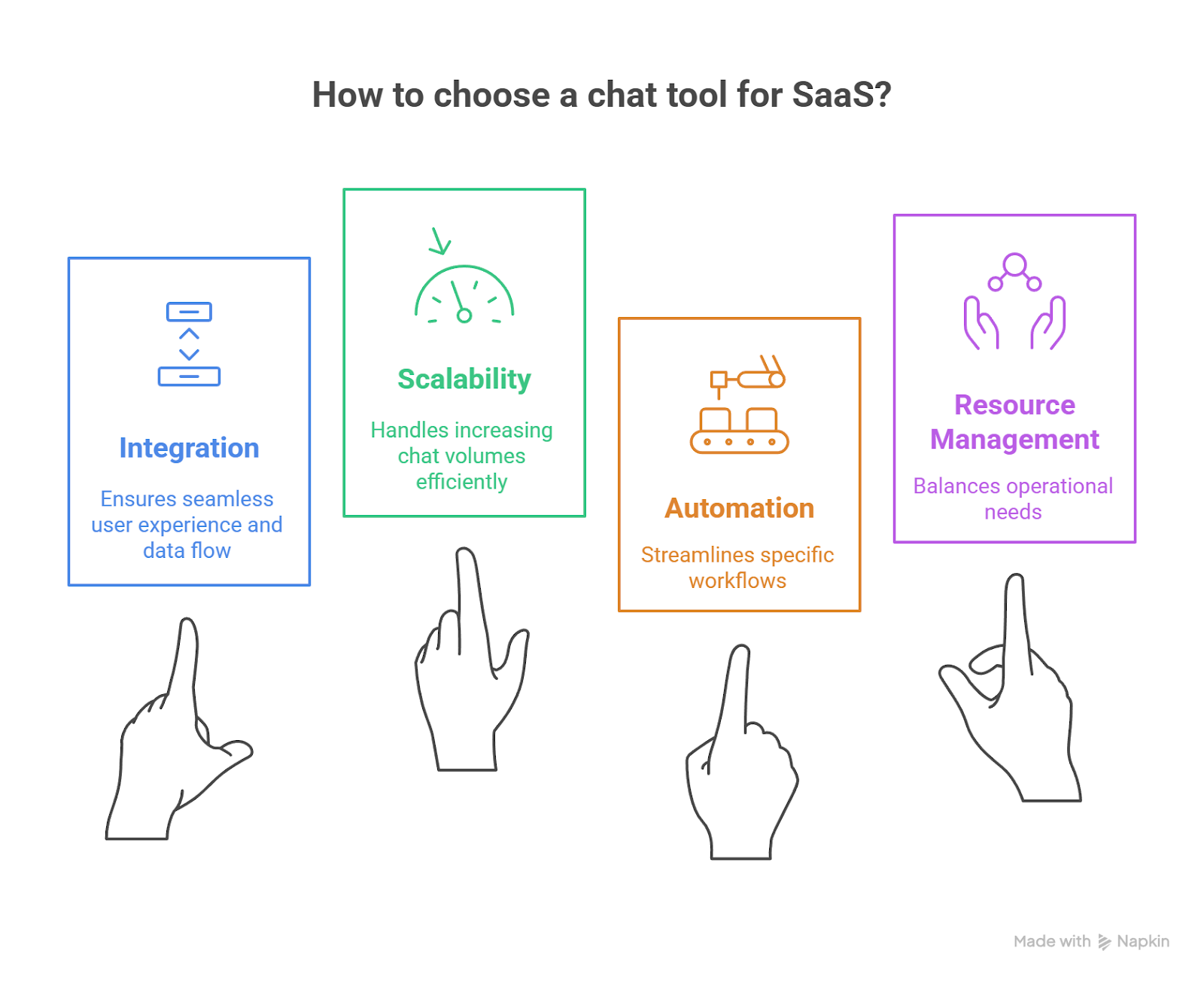
Final Thoughts on Live Chat Platforms for SaaS
Live chat is no longer just a “website widget” for many SaaS platforms; it’s a strategic part of user onboarding, conversion, retention, and upsell. Choosing the right tool depends heavily on your stage, volume, and ambition.
If I had to pick one all-around tool for a SaaS business that’s scaling and wants strong automation + support operations, I’d prefer Crescendo.ai because of its breadth and full-service model.
Whichever you pick, focus early on integration (product context + user data) and measuring metrics (response time, conversion from chat to signup/upgrade).
Resolve 90% of Support Tickets Automatically with AI Agents
✅ 10x faster customer support.
✅ 99.8% resolution accuracy.
✅ Live chat, voice, email and SMS.
✅ 100% assisted onboarding included.
✅ Starts from only $1.25/resolve.




